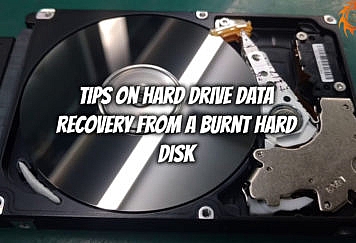The storage devices used in computers have been evolving rapidly over recent years, with SSDs and HDDs leading the charge. The days of floppy disks being used for transferring data from one computer to another are far behind us now.
Efficient optical CDs and DVDs have gradually replaced these incredibly thin plastic squares with faster and more extensive USB drives.
However, with the HDD still being the most common form of long-term storage for personal computers, stories of hard disks containing years’ worth of photos, videos, and work documents are commonplace on computer forums across the internet.
What is a Hard Drive?
A typical modern hard disk is constructed from an outer metal casing with six or seven platters (or disks) made of magnetic material (usually aluminum alloy). Data stored on these platters are arranged in concentric circles known as tracks. Each track usually contains several thousand bytes (commonly referred to as ‘sectors’).
On some models, the number of tracks per disk will be called ‘Zones,’ but this is unlikely to be relevant unless you plan to purchase some ultra-high capacity disks.
Is it Safe to Sell Your Used Hard Drive?
So, is it safe to sell your hard drives?: When selling your HDD, the obvious concern is that someone might use their newfound possession of your data against you by accessing information that was not supposed to be shared.
That may sound like an unrealistic threat, but even if your data no longer exists on the platters inside the HDD, its digital footprint remains forever etched onto each track.
For example, if a criminal were to obtain your hard drive, which once contained sensitive photos, they could run software designed specifically for recovering this type of information.
Thankfully, numerous software packages are available for protecting your sensitive data, some of which are free to use, whereas others may require a small payment.
A simple web search should reveal many suitable programs. This article will look at the more popular ‘free’ options. We assume that users already know how to securely delete files and partitions using their preferred OS (Operating System).
Wipe Your Old Hard Drive
Before selling or donating an HDD, it is essential to ensure that all personal data has been securely deleted; otherwise, you risk exposing yourself if the new owner gains access to this material.
Even if you plan on wiping the disk before selling, it is still a good idea to securely erase the data before physically disposing of the disk; otherwise, there may be traces of your HDD’s former owner left on its platters during recycling.
As we mentioned above, simply deleting files without overwriting them does not remove their digital footprint. Anyone with access to recovery software could potentially recover that information. It is also true for files removed from mobile phones or tablets.
To minimize this threat, you should use some form of software designed specifically for removing all traces of personal data from storage devices. Several such applications are available that vary in price and usability, so please carefully read through each product’s documentation before making your decision.
Here we will briefly look at two very popular ‘free’ options; DBAN (Darik’s Boot And Nuke) and HDClean (developed by TRC).
DBAN (Darik’s Boot And Nuke)
DBAN is designed for erasing magnetic storage devices such as hard disks, USB sticks, or SSDs. It completely removes all data traces on your HDD, including your operating system. It does this very quickly, making erasing your sensitive data before disposing of an HDD much easier.
Although DBAN is primarily designed to run from a CD, several files are available, so you can burn it to a USB stick if preferred.
The only downside with DBAN is that it requires physical access to wipe the disk. Although it is still possible to use the software without removing the hard disk, you will need to start up the machine in another operating system (such as Linux) or boot it using a rescue disk.
Once running, DBAN’s interface is simple and easy to navigate. Choose the device you wish to erase and wait to complete its cycle. There are several options available that allow you to customize the process entirely.
Generally, users should leave these at their default settings, as with any software that accesses sensitive parts of your computer. Please be very careful before clicking an ‘Execute’ button – especially if your computer is currently connected to external storage devices!
HDClean
HDClean is similar in some ways to DBAN in that it allows you to erase all data from a disk permanently, but it does so in a slightly different way. HDClean runs from your PC’s existing OS and works by overwriting the hard drive with random information several times.
This makes it far more difficult for anyone to recover even partial portions of your data. Its interface is quite basic but easy to navigate and allows you to choose exactly how many wipes should be performed before your disk is erased.
As with DBAN, the downside to HDClean is that it requires physical access to the disk or computer.
However, if you are donating an old computer, this will not present much of an issue. If you are selling a machine, you will need to take additional steps to ensure that any sensitive data is removed securely before the HDD leaves your possession.
Due to these limitations, DBAN and HDClean should only be used if you do not have access to a computer that can already boot from an external USB device or CD. If physical access isn’t a problem, plenty of software packages is available that allows you to wipe disks remotely even while they remain inside your PC.
Both RKill and KillDisk offer such services at very competitive prices. These tools usually include virus scanners, too, so you can thoroughly check the machine for malware before returning it to its original state.
In Summary
There are several ways to erase your hard disk before selling it securely. DBAN and HDClean will probably be fine if you donate the computer. But for machines that need to leave your premises in working order, I recommend using one of the more advanced tools available by searching Google for ‘wipe disk.’
Follow TechStrange for more Technology, Business, and Digital Marketing News.





